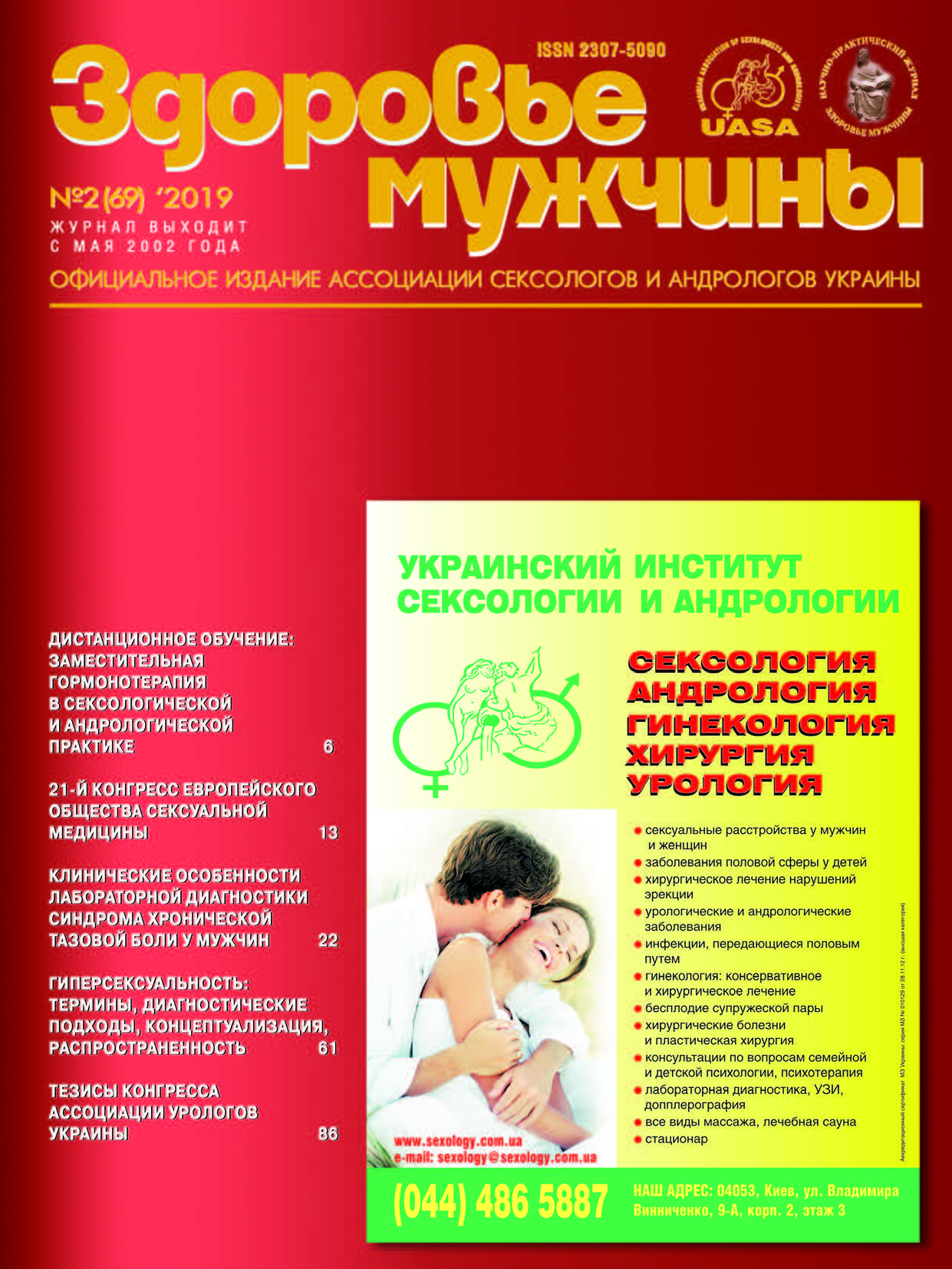Comparative Assessment of Canephron® N and Ciprofloxacin as Monotherapy of Acute Uncomplicated Cystitis in Women
##plugins.themes.bootstrap3.article.main##
Abstract
The objective: to compare the efficacy and safety of Canephron® N and ciprofloxacin as monotherapy in the management of mild forms of acute uncomplicated cystitis in women of working age.
Materials and methods. A prospective, randomized study of Canephron® N and ciprofloxacin for treating mild forms of acute uncomplicated cystitis (ACSS score <10) comprising 160 women aged 18-55 years was conducted from 2015 to 2017. Group I consisted of 80 women, who received oral Canephron® N 2 tablets 3 times daily for 30 days. Group II included 80 women who took oral ciprofloxacin0.5 g twice daily for 3 days. The results were assessed using the ACSS scale, urinalysis by microscopy, bacteriological examination ofurine, etc. The outcomes were evaluated at 3, 6 and 30 days, and one year after the treatment initiation.
Results. In group I, monotherapy with Canephron® N resulted in a marked improvement in symptoms, a decrease in the ACSS scores from 7.9 at baseline to 0.1 at day 30. The indicator of clinical efficacy (recovery) was 93.75%, bacteriological efficiency was 91.3%, relapse of cystitis within one year was observed in 5% of patients; no side effects were registered. In group II, the symptoms and bacteriuria decreased more rapidly in the early periods, but after 30 days the results of clinical and bacteriological efficacy did not differ from the group I (93.75 and 91.3%, respectively). Side effects and cystitis relapses were noted in 18.8% and 12.5% of patients, respectively.
Conclusion. The findings of the study show that Canephron® N is an effective and safe alternative to treating mild forms (ACSS score <10) of acute uncomplicated cystitis in women, allowing the use of antibiotics to be reduced. In our opinion, patients with more severe forms of acute uncomplicated cystitis should be treated with traditional antibiotic therapy.##plugins.themes.bootstrap3.article.details##

This work is licensed under a Creative Commons Attribution 4.0 International License.
Authors retain the copyright and grant the journal the first publication of original scientific articles under the Creative Commons Attribution 4.0 International License, which allows others to distribute work with acknowledgment of authorship and first publication in this journal.
References
Grigoryan L., Zoorob R., Wang H., Trautner B.W. Low Concordance With Guidelines for Treatment of Acute Cystitis in Primary Care. Open Forum Infect Dis. 2015;2(4):159. Doi:10.1093/ofid/ofv 159.
Kulchavenya E.V., Breusov A.A., Brizhatyuk E.V., Shevchenko S.Yu. Acute cystitis-do we need antibiotic always? Urologiia. 2016;1:25-28.
Zaitsev A.V., Kasyan G.R., Spivak L.G. Cystitis. Urologiia. 2017;1(1):34–44.
Little P., Moore M.V., Turner S. Effectiveness of five different approaches in management of urinary tract infection: randomized controlled trial. BMJ. 2010;340:199-204. Doi:10,1136/bmj.c.199.
Ferry S.A., Holm S.E., Stenlund H. The natural course of uncomplicated lower urinary tract infection in women illustrated by a randomized placebo controlled study. Scand J Inf Dis. 2004;36:296-301. Doi:10.1080/00365540410019642.
Perepanova T.S., Kozlov R.S., Rudnov V.A., Sinyakova L.A. Antimicrobial therapy and prevention of infections of the Kidneys urinary tract and male genital organs. Federal clinical guidelines. M., 2015:23-29. Doi: 10.17116/ terarkh2016884100-104.
Naber K.G., Alidzhanov Zh.F. Are there alternatives to antimicrobial therapy and prophylaxis of uncomplicated urinary tract infections? Urologiia. 2014;6:5-13.
Ivanov D., Abramov-Sommariva D., Moritz K., Eskötter H., Kostinenko T., Martynyuk L., Kolesnik N., Naber K.G. An open label, non-controlled, multicentre, interventional trial to investigate the safety and efficacy of Canephron N in the management of uncomplicated urinary tract infections (uUTLs). Clinical Phytoscience. 2015; 1:7. Doi:10.1186/s40816-015-0008-x.
Amdiy R.E., Al-Shukri S.Kh, Kuzmin I.V., Sorokin N.V., Chaplitskiy E.A., Skvortsov M.V., Alekseev A.S., Okunchaev A.Sh., Turbin A.A., Timaeva G.R., Bulaev D.V., Moskaleva Yu.S. Use of Kanefron in treatment of acute uncomplicated cystitis in women. Urologicheskie vedomosti. 2016;6(2):16-22. Doi: 10.17816/uroved6216-22.
Veshkina A.A., Zhuravlev O.V., Semakov D.V., Kuzub I.I., Bazhenov I.V. The possibilities of using herbal medicine in urinary tract infections treatment. Ural. med. J. 2017;2:130-132.
Аляев Ю.Г., Амосов А.В., Григорян В.А. Применение растительного препарата Канефрон Н у больных с хроническим циститом и мочекаменной болезнью. Урология 2005;4:29-33.
Аляев Ю.Г., Амосов А.В., Султанова Е.А. Канефрон Н Обзор фармакологических и клинических данных. – М., 2015. – 128 с.
Перепанова Т.С., Хазан П.Л. Растительный препарат канефрон Н в лечении и профилактике инфекций мочевых путей. Врачебное сословие. 2005;5:44-46.
Davidov M.I., Igoshev A.M. Prevention of complications of distance shock-wave lithotripsy. Phytomedicine Research and Experience Summit. Nuremberg, 3-4 of July. 2017;24-25.
Alidjanov J.F., Abdufattaev U.A., Makhsudov S.A., Pilatz A., Akilov F.A., Naber K.G., Wagenlehner F.M. New self-reporting questionnaire to assess urinary tract infections and differential diagnosis: acute cystitis symptom score. Urol Int. 2014;92(2):230–236. Doi:10.1159/000356177.
Naber K.G. Efficacy and safety of the phytotherapeutic drug Canephron N in prevention and treatment of urogenital and gestational disease: review of clinical experience in eastern Europe and Central Asia. Research and reports in Urology. 2013;5:39-46. Doi:10.2147/rru.s39288.
Аверьянова Н.И., Козлова В.В., Косарева П.В., Одинцова О.В., Маслов Ю.Н. Исследование антибактериального действия канефрон Н // Фармация. 2007;1:41-44.
Künstle G., Brenneis C., Haunschild J. Efficacy of Canefron N against bacterial adhesion, inflammation and bladder hyperactivity. Poster. 28 th Annual Congress of the European Association of Urology (EAU). Mailand, Italien, 15. bis 19. Marz 2013. Doi: https://doi.org/10.1016/ S1569-9056(13)61153-7.
Naber K.G., Kogan M.I., Wagenlehner F.M.E., Siener R., Gessner A. How the microbiome is influenced by the therapy of urological diseases: standard versus alternative approaches Clinical Phytoscience. 2017;3:8. Doi: 10.1186/s40816-017-0045-8.
Kogan M.I., Naboka Y.L., Ibischev K.S., Gudima I.A., Naber K.G. Human urine is not sterile – shift of paradigm. Urol int. 2015;94(4):445–52. Doi: 10.1159/000369631.





